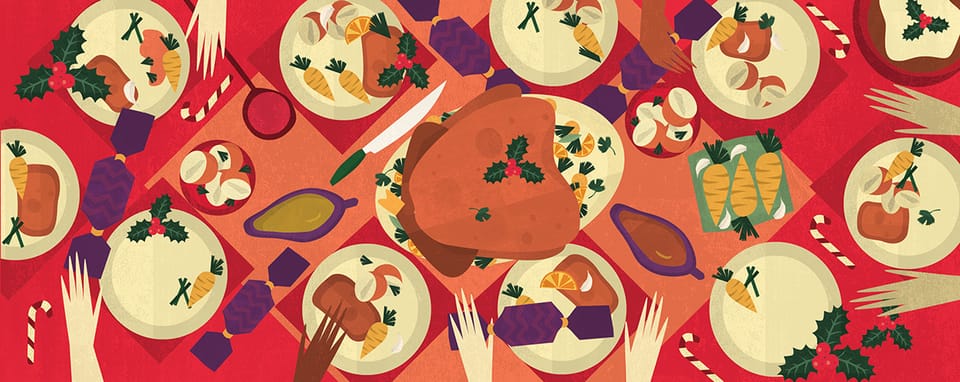5 Tips to Survive the Festive Season Like a Pro

The smell of cinnamon and nutmeg fills the air. Fairy lights twinkle in every corner, and your calendar is packed with family dinners, work parties, and impromptu catch-ups.
It's officially the festive season!
Yet, amidst the joy, there's also a quiet undercurrent of stress: the fear of overindulgence, skipped workouts, or spiraling off track.
Sound familiar?
Let me tell you a story. Last Christmas, my friend Sarah found herself in the same whirlwind. She’d start each day with the best intentions—eat clean, get her steps in, and be present. But by the end of the week, she’d spiral into guilt over an extra slice of pie or skipping her usual run.
One evening, as she sipped her third glass of wine, she sighed and said, “Why do I feel like the holidays are a test I’m failing?”
Maybe you’ve felt this too.
But here’s the truth: surviving (and thriving!) during the holidays doesn’t mean perfection. It means enjoying the season while taking small, intentional steps to care for your mind and body.
Let’s unpack five practical tips that can help you embrace the joy of the season without guilt or overwhelm.
1. Start with Protein Power
Before heading to a party or sitting down for a festive feast, eat about 30 grams of protein. Think a grilled chicken breast, a cup of Greek yogurt, a protein-packed smoothie or some lean biltong.
The science: Protein takes longer to digest than carbs or fats, keeping you fuller for longer. It also helps stabilize blood sugar, preventing the crash-and-crave cycle that can lead to overeating.
How to do it: If you’re short on time, grab a boiled egg or a handful of biltong before heading out. Starting with protein isn’t about being restrictive—it’s about feeling satisfied so you can enjoy your meal without the constant tug of hunger.
2. Bulk Up on Veggies at Meals
Picture this: a plate filled with vibrant greens, crunchy carrots, and roasted peppers. Piling your plate with non-starchy veggies isn’t just about being “healthy”—it’s a strategy that works.
The science: Veggies are high in fiber and water, which naturally helps you feel full with fewer calories. They also provide essential vitamins and antioxidants, giving your body a festive glow from the inside out.
How to do it: Before diving into the rich casseroles or desserts, load up your plate with veggies. Love roasted Brussels sprouts or sautéed green beans? Make them the star of your meal. Bonus: the extra fiber supports digestion, which is especially helpful during the season of indulgence.
3. Sneak in Steps
Between wrapping gifts and endless errands, the holidays can feel like a marathon, without the movement. But staying active doesn’t mean committing to intense gym sessions.
The science: Walking after meals helps regulate blood sugar levels and supports digestion. Plus, movement boosts endorphins, those feel-good chemicals that can counteract holiday stress.
How to do it: Break your steps into bite-sized chunks. Walk for five minutes after every meal or pace around while catching up with relatives. By the end of the day, you’ll have racked up more steps than you think. Bonus tip: invite family members to join, it doubles as quality time!
4. Be Kind to Your Inner Critic
Imagine your best friend calls you, upset after overeating at a holiday dinner. Would you shame her? Of course not! So why is it so hard to extend that same compassion to ourselves?
The psychology: The holidays can trigger feelings of guilt or “all-or-nothing” thinking. But research shows that self-compassion helps people stay consistent with healthy habits in the long run.
How to do it: If you overindulge, remind yourself that it’s one meal, not a reflection of your worth. Instead of focusing on what went “wrong,” ask yourself: What went well today? Treating yourself with kindness isn’t just a mindset shift—it’s a skill that can transform your relationship with food and fitness.
5. Focus on the Memories, Not Just the Menu
Years from now, will you remember the number of cookies you ate—or the laughter shared with loved ones? The holidays are about connection, not calorie counting.
The psychology: Redirecting your focus to experiences, rather than food, can reduce anxiety and foster a sense of gratitude. And gratitude, as studies show, is a powerful antidote to stress.
How to do it: During gatherings, challenge yourself to engage deeply. Listen to a family member’s story, snap candid photos, or start a heartfelt conversation. Food can still be a part of the joy—but it doesn’t have to be the center of it.
Reflection & Action: Your Holiday Survival Plan
The festive season is a time to celebrate, not scrutinize. Take a moment to reflect: What’s one thing you want to prioritize this holiday season, your health, your relationships, or maybe even just your peace of mind?
Write it down. Let it guide your choices.
And remember Sarah? By New Year’s, she didn’t just survive the holidays—she thrived. Her secret? Letting go of the need to be perfect and focusing on small, consistent habits. This year, let that be your story too.
Here’s to a season filled with joy, connection, and mindful indulgence!
Wishing you all an amazing festive season.
RD Betus Coetzer